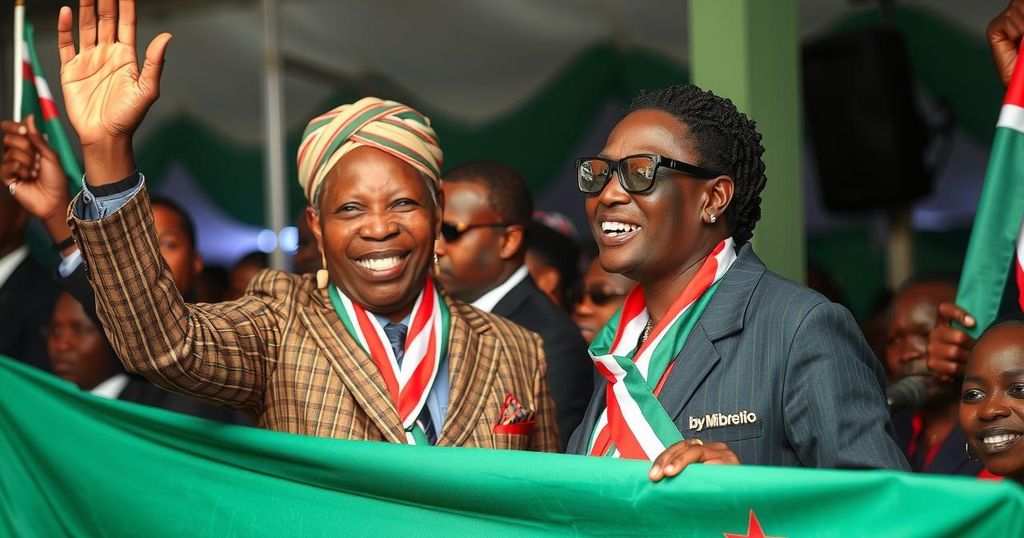Politics
AFRICA, BOTSWANA, CORRUPTION, DEMOCRACY, DU, DUMA BOKO, EUROPE, EUROPE/ASIA, EUROPEAN UNION, INTERNATIONAL VIEWPOINT, L ’ ANTICAPITALISTE, NATIONAL ASSEMBLY, PAUL MARTIAL, PORTUGAL, RUSSIA, SANCTIONS, SOUTH AFRICA, SOUTH WEST AFRICA PEOPLE ’ S ORGANISATION, UKRAINE, VIEWPOINT
Fatima Khan
0 Comments
Pabloite NPA Commends UDC’s Historic Electoral Victory in Botswana
In a historic election, Duma Boko of the Umbrella for Democratic Change (UDC) became Botswana’s first opposition president, overcoming the long-standing Botswana Democratic Party (BDP). The UDC’s victory reflects popular demands for change after decades of BDP rule. Despite promises of reforms, Boko’s agenda appears aligned with pro-business interests, raising skepticism about the UDC’s commitment to social reform amidst ongoing economic challenges in the region.
The recent election of Duma Boko as president of Botswana marks a historical pivot, as it is the first time an opposition party, the Umbrella for Democratic Change (UDC), has overcome the Botswana Democratic Party (BDP), which held power since independence in 1966. The UDC secured 35 of 61 National Assembly seats, reflecting a deep-seated desire for social transformation among the populace weary from decades of BDP governance. This political shift is part of a broader regional trend where traditional ruling parties face decline, largely due to rising poverty and state repression, compounded by global economic pressures exemplified by NATO’s actions related to the war in Ukraine.
Despite Duma Boko’s portrayal of the UDC as a pro-social democratic force championing youth employment and healthcare initiatives, there are indicators suggesting that the UDC’s commitment to these promises is superficial. Boko represents a faction that seeks to benefit from the wealth generated by international corporations, particularly in the mining sector, and has already signaled potential policy directions favoring economic liberalization and business deregulation. Moreover, Boko’s immediate efforts to repair relations with De Beers, a dominant player in Botswana’s diamond industry, underscore his alignment with corporate interests rather than delivering on social reforms.
Throughout the campaign, the UDC’s proposals focused on job creation and economic diversification away from the diamond industry, which accounts for a significant portion of Botswana’s economy. However, there is skepticism regarding whether these initiatives will be prioritized given the party’s pro-business stance. Further complicating the political landscape, Boko’s acceptance of military cooperation within the Southern African Development Community (SADC) raises concerns about state repression and potential actions against social dissent.
Critics argue that the UDC’s policies, despite being framed positively, align more with bourgeois interests rather than genuinely addressing the needs of the working class. By romanticizing the UDC as a leftist entity, narratives produced by supporters—such as the NPA and International Viewpoint—may hide the reality of their pro-capitalist agenda, diverting attention from the urgent necessity for a grassroots struggle aimed at socialism. Thus, the example of Botswana illustrates Trotsky’s theory of Permanent Revolution, emphasizing the critical relationship between democratic rights and the fight for socialism against local and imperialist bourgeois forces.
The article discusses a significant political development in Botswana with the recent election of Duma Boko from the Umbrella for Democratic Change (UDC), marking a historic shift in the political landscape. For 58 years, the Botswana Democratic Party (BDP) retained uninterrupted control of the government, and this change reflects widespread discontent among citizens regarding socioeconomic issues such as rising inequality and poverty. The election results are part of a broader regional trend where traditional ruling parties face intensified opposition amid economic challenges and demands for social justice. The narrative also critiques how various factions, including the UDC, may present themselves as alternatives to the status quo, while still aligning with capitalist interests.
In conclusion, the election of Duma Boko as Botswana’s president symbolizes a pivotal change in the political dynamics of the country but raises important questions regarding the commitment of the UDC to genuinely progressive policies. Despite claims of social reform, the party’s pro-business orientation and connections to international capital may undermine its promises to the working class. The evolution of Botswana’s political landscape serves as a reminder of the need for a concerted, grassroots movement committed to socialism in the face of persistent inequality and capitalist exploitation, aligning with Trotsky’s notion of Permanent Revolution.
Original Source: www.wsws.org




Post Comment